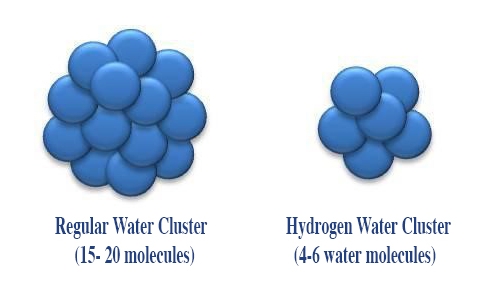
Hydrogen is the lightest element in the Periodic Table and the most abundant chemical substance in the Universe. Hydrogen is a potent anti-oxidative, anti-apoptotic and anti-inflammatory agent and so may have potential medical applications in cells, tissues, and organs. There are several methods to administer hydrogen, such as inhalation of hydrogen gas, aerosol inhalation of a hydrogen-rich solution, drinking hydrogen dissolved in water, injecting hydrogen-rich saline (HRS), and taking a hydrogen bath. Drinking hydrogen solution (saline/pure water/other solutions saturated with hydrogen) may be more practical in daily life and more suitable for daily consumption. Hydrogen is seldom regarded as an important agent in medical use, especially as a therapeutic gas. Inhaled hydrogen gas has antioxidant and anti-apoptotic properties that protect the brain against ischemia-reperfusion (I/R) injury and stroke by selectively reducing hydroxyl radicals (·OH) and ONOO− in cell-free systems. Hydrogen can protect various cells, tissues, and organs against oxidative injury. Hydrogen appears to fit the combination and has both high therapeutic potential and a high safety profile. Hydrogen helps attenuate excessive oxidative stress and inflammation, both of which are at the root of virtually every disease and pathology. The oxidation rate of hydrogen increases with an increasing amount of oxidative stress.
Hydrogen water has a very small cluster size (4-6 molecules) as compared to regular water (15-20 molecules). Therefore, hydrogen water can penetrate deep within your cells, mitochondria, tissues, capillaries, and other organs and remove toxic waste from deep within your body. Regular water could not penetrate so deep in your body because of its size being so large. Drinking hydrogen water on a regular basis detoxifies your body and keeps your body hydrated for a longer time. Hydrogen is a non-radical, non-reactive, non-polar, highly diffusible gas, thus it is unlikely to have specific binding sites, or interact with specificity on a specific receptor.
Hydrogen has beneficial effects on obesity and metabolism. The various cell modulating effects of hydrogen is responsible for mediating the anti-inflammatory, anti-allergy, and anti-obesity effects. The exact mechanism of how hydrogen modulates signal transduction, gene expression, and protein phosphorylation is still under investigation. Hydrogen accomplishes the various cell modulating effects is by modifying lipid peroxidation in the cell membrane. Hydrogen administration reduces brain edema, blocked pathological tau expression, and maintains adenosine triphosphate (ATP) levels. Hydrogen therapy is effective at increasing resilience to acute and chronic stress by regulating the hypothalamic-pituitary-adrenal axis and the inflammatory responses to stress. Drinking hydrogen water (600ml/day) for 4 weeks resulted in decreased sympathetic nerve activation at rest, and improved mood and anxiety.
In conclusion, hydrogen is a new potential therapeutic agent for the treatment of various diseases in emergency and critical care medicine. Hydrogen is safe, easy to administer, and has immediate clinical application.
Call Now: 1800-102-0908
Website: www.kykindia.com
151 comments. Leave new